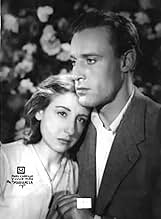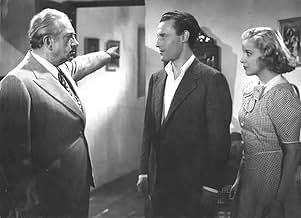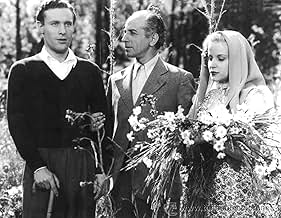Marianela es una chica huérfana en un pueblo en el que guía al hijo ciego de un rico terrateniente, del que está enamorada en secreto. Un médico promete devolverle la visión y Nela desespera... Leer todoMarianela es una chica huérfana en un pueblo en el que guía al hijo ciego de un rico terrateniente, del que está enamorada en secreto. Un médico promete devolverle la visión y Nela desespera creyendo de no la querrá si puede ver su cara.Marianela es una chica huérfana en un pueblo en el que guía al hijo ciego de un rico terrateniente, del que está enamorada en secreto. Un médico promete devolverle la visión y Nela desespera creyendo de no la querrá si puede ver su cara.
- Dirección
- Guión
- Reparto principal
- Premios
- 1 premio y 1 nominación en total
Reseñas destacadas
Sensitive and touching film well directed by Benito Perojo with extremely theatrical interpretations
An enjoyable and agreeable film with great feeling and high sensibility . The film is acceptable but being spoiled by stagy acting and a really sentimental theme . Based on a prestigious novel by the notorious writer Benito Pérez Galdos , being adapted by another famous writer Álvarez Quintero . It displays adecuate production design and appropriate score by Gudiri . As well as evocative cinematography in Black and white , being shot in Orphea studios and location in Asturian mines and Tossa de Mar . There is another version: Marianela 1972 by Angelino Fons with Rocio Durcal , Jose Suárez, Alfredo Mayo, German Cobos.
The motion picture was professionally directed by Benito Perojo , though it results to be some dated and corny . Perojo was a powerful productor and director who created his own company , directing and producing a lot of films. He often made dramas , musical, Zarzuela, comedy movies, such as El Hombre que tenia el alma Blanca 1934 , Es my Hombre , and Verbena de la Paloma . During Spanish Civil Was he shot three films in Germany : El Barbero de Sevilla, Suspiros de España , Mariquilla Terremoto and two in Italy : Los Hijos de la Noche , La Última Falla . He returns Spain directing Marianela and Goyescas with the great Imperio Argentina . After going to Argentine where he directs nine films and ultimately he goes back Spain , becoming an important producer financing a great number of movies as Doña Francisquista by Ladislao Vadja , Novio a la Vista by Berlanga , La Fierecilla domada by Antonio Roman , Carmen la de Ronda by Tulio Demicheli, Las Aventuras de Don Juan by John Berry and many others
¿Sabías que...?
- Citas
Nela: Do you know what flowers really are?
Pablo: Flowers are like earth' little smiles. I don't know very much about plants, really.
Nela: You fool...! Flowers are earth' stars.
Pablo: What a sillyness! So what are the stars then?
Nela: The stars are the eyes of those who have gone to heaven.
Pablo: Then, the flowers...
Nela: Flowers are the eyes of those who have dead and still haven't gone to heaven. From down there they can't help to look to the earth, so they grow up like prayers and rise in the form of flowers. That's why they do look up to the sky.
Pablo: That's nonsense.
Nela: And don't you know stars go down? I have seen them falling like this, describing a line.
Pablo: He laughs
Nela: Yes sir! Stars come down to earth when they need to say something to those who are good!
- ConexionesVersion of Marianela (1955)
Selecciones populares
Detalles
- Duración
- 1h 27min(87 min)
- Color
- Mezcla de sonido
- Relación de aspecto
- 1.37 : 1















